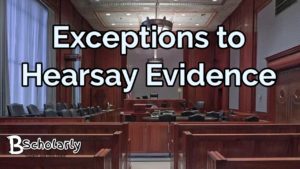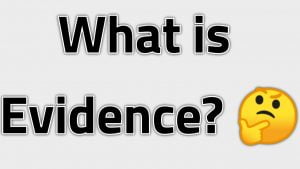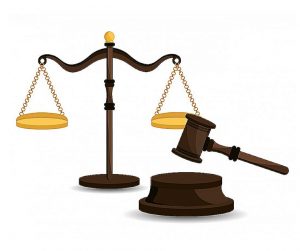Exceptions to hearsay rule: In law, it is apparent that hearsay evidence is not admissible. This is one of the exclusionary rule in the law of evidence. It is one of the most complex and most confusing of the exclusionary rule of evidence. In this article I am going to explain to you what hearsay evidence is, the reasons why hearsay evidence is not admissible in court and finally; i will discuss some of the exceptions to hearsay evidence. That is, instances where hearsay evidence will be admissible in the court.

If you have been searching for an article that clearly explains the common law exceptions to hearsay rule, this is the right article for you. I enjoin you to read carefully as I will tide you over.
Also read:
- Types of Judicial Evidence that is admissible in court
- Exceptions to privity of contract
- Smith v Selwyn: Facts, Issues and Decision of the court
- How to answer law problem questions using IRAC method
What is hearsay evidence?
Hearsay evidence is any evidence (oral or written) given otherwise than by a witness in a court proceeding. According to Cross and Tapper, hearsay is any evidence other than one made by a person while giving oral evidence in the proceedings and is inadmissible as evidence of any fact.
In a layman’s language, hearsay evidence are evidence given by persons who heard them from another person but do not know whether they are true. So, when you give any evidence which someone else told you in the court, it is a hearsay evidence and it will not be admissible as evidence.

Reasons why hearsay evidence is not admissible
According to Cross and Tapper, hearsay evidence is not admissible in court because of the increased danger of impaired perception, bad memory, ambiguity and insincerity, coupled with the decreased effectiveness of conventional safeguards for checking fabricated evidence in court. Another reason why hearsay evidence is not admissible is because of the absence of any opportunity to cross-examine the original maker of the statement in court.
In other words, since the court cannot cross-examine the original maker of a statement in court, it is not wise to accept such statement as evidence. But where the maker is in court and he admits that he actually made the statement, the court may accept it in evidence.
Exceptions to hearsay
As a result of the injustice caused by the inflexibility of the hearsay rule, several exceptions were created by the common law where hearsay evidence will be admissible in the court. These exceptions include:
1. Dying Declaration:
A dying declaration is a statement made by a person who may die from the injury received from a person who the deceased person identified as the person who inflicted on him the injury that eventually caused his death. It is one of the exceptions to the rule of direct evidence to prove facts in issue.
At common law, for a statement made by a deceased to be a dying declaration, he must have been, at the time of making the statement, in a settled hopeless expectation of death and not merely believed himself to be in danger of approaching death.
Also read: 5 (five) Advantages and disadvantages of an unwritten
2. Statement made in the ordinary course of business
A statement is admissible when made by a person in the ordinary course of business, and in particular when it consists of any entry or memorandum made by him in books, electronic device kept in the ordinary course of business, or in the discharge of a professional duty, or of an acknowledgement written or signed by him of the receipt of money, goods, securities or property of any kind, or of a document used in commerce written or signed by him or of date of a letter or other document usually dated, written or signed by him.
Provided that the maker made the statement contemporaneously with the transaction recorded or so soon thereafter that the court consider it likely that the transaction was at the time still fresh in his memory.

In R v Lawani (1958) LLR 97, an entry made in an Accident Report Book by a police officer who later died before the trial was held admissible since it was made in the course of his duty.
Also, in R v McGuire, the defendant was being tried for arson. A report prepared by a deceased scientific officer who visited the scene of the fire shortly after it happened, stating the extent of the damage, state of the building, was held to be admissible even though they were not given directly by him.
MUST READ: Top 10 Richest Lawyers in Nigeria 2024
3. Statement made against the interest of the maker with special knowledge
When a statement is against the pecuniary or proprietary interest of the person making it and the said person had peculiar means of knowing the matter and had no interest to misrepresent it, such statements are admissible.
The above provision is the same under common law. In Sussex Peerage Case, the House of Lords held that a statement made by a clergyman who later died, which exposed him to criminal prosecution would not be admissible under this heading.
However, in Higham v Ridgeway (1808) 10 East 109, an entry made by a mid wife that he had been paid for services rendered in connection with the birth of a child was held to be admissible since it was against his pecuniary interest.
4. Statement as to public right, custom and matter of general interest
Under section 43 of the Evidence Act (Nigeria), a statement made by a deceased person as to an opinion as to the existence of any public right or custom or matter of public or general interest, of the existence of which, if it existed, he would have been likely to be aware, and when such statement was made before any controversy as to such right, custom or matter has arisen, is admissible.
MUST READ: Reasons why indirect rule failed in Eastern Nigeria
5. Statement that Relates to existence of relationship
A statement of relevant facts made by a deceased person is relevant and admissible in court when the statement relates to the existence of any relationship, marriage or adoption between persons, if the person making the statement had special means of knowledge of such relationship.

Under this exception, a statement made by “A” before his death that he was present at the wedding ceremony between Miss “X” and Mr “Y” will be relevant in a trial in which the court has to determine whether a marriage exists between the parties.
6. Declaration by Testators
Declaration by a deceased Testator as to his testamentary intention and as to the content of his will are, under certain circumstances, deemed relevant. These circumstances include:
- When the will of the testator has been lost and there is a question as to what were its contents
- When the question is whether an existing will is genuine or not
- When the question is whether any and which of the more existing documents than one constitutes his will.
MUST READ:
- Differences between military and civilian government
- Pillars of democracy in Nigeria
- Features of democracy: See the features of democratic state
- See the characteristics of your fundamental human rights and how to protect them
- How to prepare and pass WAEC examination excellently
In summary, i must restate that the reason why all these exceptions were created by common law is because of the injustice administered by the previous rule that hearsay evidence is not admissible in court. Meanwhile, it is pertinent to note that these rule does not apply to the legal system of every state. I basically used the Evidence Act of Nigeria (2011) to deduce some of the exceptions mentioned above but like I said, not all of them is applicable in every state.
Hope this article was helpful? If you still have questions or contributions to make on the exceptions to hearsay evidence, kindly send it using the comment section. I will be glad to hear from you!

Edeh Samuel Chukwuemeka, ACMC, is a lawyer and a certified mediator/conciliator in Nigeria. He is also a developer with knowledge in various programming languages. Samuel is determined to leverage his skills in technology, SEO, and legal practice to revolutionize the legal profession worldwide by creating web and mobile applications that simplify legal research. Sam is also passionate about educating and providing valuable information to people.
